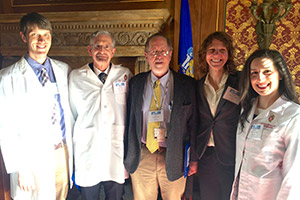UW Department of Family Medicine and Community Health (DFMCH) faculty and residents were among the over 300 physicians from around Wisconsin who visited the State Capitol on February 10, 2016, to participate in Doctor Day 2016.

DFMCH participants in Doctor Day 2016, from left: Madison residency program graduate Aistis Tumas, MD; faculty David Deci, MD; faculty John Beasley, MD; resident Jennifer Perkins, MD; resident Allison Couture, DO.
The event—organized by the Wisconsin Medical Society, with support from 17 state medical specialty societies, the UW School of Medicine and Public Health and the Medical College of Wisconsin—brings physicians together to advocate on behalf of patients and the medical profession.
Briefing on Three Key Issues
After a welcome from Lieutenant Governor Rebecca Kleefisch, participants were briefed about three current health care-related legislative issues:
- Assembly Bill 489, which contains language to remove the health care provider exception to reporting adolescent sexual content and activity;
- The Heroin, Opiate Prevention and Education (HOPE) Agenda, and the associated Assembly Bill 364, which requires that physicians review a patient’s record under the Prescription Drug Monitoring Program before issuing a prescription for potentially addictive drugs; and
- Assembly Bill 549, which would authorize physical therapists to order x-rays for patients outside a hospital setting or without the supervision of a physician.
Keys to Effective Advocacy
The DFMCH’s David Deci, MD, then introduced Tim Hoven, who spoke about the legislative process, barriers to effective advocacy and strategies for developing relationships with legislators.
“We hope to get as many family physicians from around the state in a position where they may serve as key legislative contacts,” Dr. Deci explained. “As family physicians, we have broad exposure to our patients, we’re heavily engaged in our community, we understand the principles of public health and social determinants of health, and are best positioned to educate, advise and influence legislation that’s in the best interests of our
[specialty] and our patients.”
Following afternoon presentations from leaders of three Wisconsin medical specialty societies, participants then met in person with legislators to further discuss the issues presented earlier in the day.
‘An Excellent Learning Experience’
The day was also a valuable opportunity for learners wishing to engage in advocacy efforts. DFMCH resident Alison Couture, DO, who attended the event and who has had experience with national legislative advocacy, emphasized that individuals can collaborate with society policy and advocacy teams in addition to, or instead of, meeting one-on-one with legislators.
“[Doctor Day] was an excellent learning experience,” she reflected. “We absolutely have a voice. The most common thing I heard from legislators is that ‘we want to hear from you and we need to hear your opinion.’”
Published: February 2016
